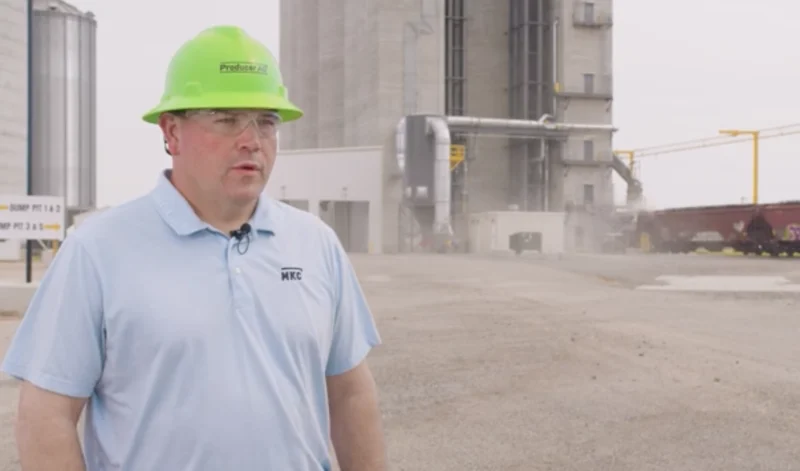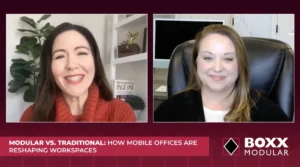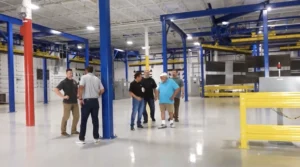Is the American Steel Industry Ready for Infrastructure Investments?
Nucor CEO Leon Topalian says the American steel industry can handle any increased demand rising from passage of an infrastructure bill in Congress. He appears on “Balance of Power.” Watch or read the transcript below.
—
Host: The American Society of Civil Engineers gave US infrastructure systems a grade of C minus on the report card that is used every four years. That’s up from NAD plus back in 2017. And President Biden is meeting with his Secretary of Transportation and members of Congress to talk about what can be done about it. We welcome now, Leon Topalian. He is Neucor’s president and CEO. Leon it’s great to have you with us, in part because if we’re going to finally do so on infrastructure, it’s going to take some steel. So you have a dog in this hunt, but are we finally going to do so? We’ve been talking about this forever, haven’t we?
Topalian: We sure have. And David, thank you for having me on the show today and this incredibly, critically important topic. And yes, it’s been on the doorstep of America for a very long time. You know, the fact that we’re driving on roads and bridges and highways that were designed during the Eisenhower administration leaves a lot wanting. We’ve got to have something meaningful, like $1 trillion or greater to be invested into our country for roads, bridges, waterways, dams, but also the broadband systems to bring rural communities onto the internet and give them the capability to homeschool and work from home.
Host: So I’m curious the fact that everybody’s for it, Democrats and Republicans, sounds like it’s a good thing. I wonder if it’s actually a bad thing in the sense that if everybody’s really for it, it would have gotten done by now. And one of the things I think that stops it is when it gets down to how you pay for it. There was a disagreement, certainly during the Trump administration about that. What makes you think that this time will be different? Because, as I say, we’ve been here before.
Topalian: You know, that’s a great point, David, and it’s one of my concerns, I was in Washington for two days this week and having that very conversation with some of our elected officials. And I think what’s different today is a recognition that there are things that are so structurally deficient. For example, in the ASCE report card, there’s 600,000 bridges in the United States. 50,000 of them have been rated structurally deficient. And again, from a company perspective, safety is our most important value and how we care for the men and women who make up our family. If we had something that was going to injure people or hurt people in our operations, we would shut down immediately to fix that. In 50,000 bridges – 180 million Americans are crossing those bridges every day, David. And so if we’re waiting for one of those to fail, if we’re waiting for a bridge to collapse or a waterway to give way, it’s a really failed strategy. The time to act is now. And I think also and again, the conversations I’ve had, I think there is going to be bipartisan support and I think we’re going to see something meaningful done in the coming months.
Host: As a practical matter, do we have the capacity to do it? Let’s assume for the moment we waved a magic wand and they did it. Do we have the capacity? Because steel prices are really sort of at high levels right now. There’s limited capacity. Is Nucor going to build more plants? You know, we’re already building more plants?
Topalian: But I can assure you, yes, the United States Steel industry is the safest, cleanest to build anything anywhere in the world. And so I can tell you from a manufacturing sector, we stand poised and ready to handle a meaningful and substantial infrastructure bill, as well as the complexities that come with it. So companies like Nucor who are investing nearly $4 billion in our current campaign to expand and grow and continue to meet our customers’ demands of tomorrow, we can certainly handle this infrastructure package.
Host: Can you build the capacity the way that you would need to? Again, assuming we got a really big infrastructure package consistent with the climate change priorities of this administration, is that could put limits on you?
Topalian: Yeah, look, at the end of the day, the United States Steel industry is the cleanest and safest anywhere in the world. And in particular, as I think about Nucor, you know, our value proposition is to be the cleanest steelmaker on this planet. And so on average, we’re 2 and 1/2 to three times cleaner than the greenhouse gas emissions that are being emitted from countries around the world compared to the United States. So I think from a sustainability standpoint, our investments are to move into PPAs, which we announced our first one last year, and we’re going to continue to be on the cutting edge of ensuring Nucor as best days are in front of it David.
Host: And Leon, as you talk to legislators down in Washington, as you say you are right now, how do you make sure that if they do appropriate the money, it actually goes for infrastructure? We did this before, didn’t we, around 2008, 2009, and didn’t necessarily go for that purpose. A lot of states used it to help their budgets.
Topalian: Yeah, that’s another excellent point and certainly some of our advocacy and my advocacy is to make sure that those things get it into the states, into the right hands, so that the federal package will have meaningful repercussions for the roads, broadband systems. But part of that as well is making sure we have something meaningful in terms of the buy American provisions, ensuring that the US manufacturing sector is supported through this infrastructure bill. So all of those things need to get worked out, but we’re going to remain tireless advocates to ensure that that happens.
Host: So there’s so much that needs to be done. Everyone seems to agree with that, you know this business awfully, awfully well. What would you put at the top of the list in terms of the nature of the projects that both are needed? And also we could get going right away?
Topalian: You know, I would certainly put broadband at near the top, I would put the waterways and water systems, dams and the different systems that bring global trade into our ports around this nation and then the intermodal freeways, you know, ensuring that we have the bridges across our nation are probably the top three areas I would focus those funds.
Host: How confident are you that actually something will get done within the next 12 months?
Topalian: You know, I would tell you, I’ve been in this industry now for 25 years. And like you had said earlier, we’ve seen this problem here. It’s been on our doorstep. But I’m more optimistic today than I’ve ever been that we’re going to see something meaningful happen.
Host: Are you concluding in your long term plans?
Topalian: Yes, you know, I think that that will come and we’ll see. I think if it passes this year, 22 will really be the year you’ll start seeing that meaningful investment make it out into the infrastructure packages.
*Bloomberg contributed to this content
—
Follow us on social media for the latest updates in B2B!
Twitter – @MarketScale
Facebook – facebook.com/marketscale
LinkedIn – linkedin.com/company/marketscale









